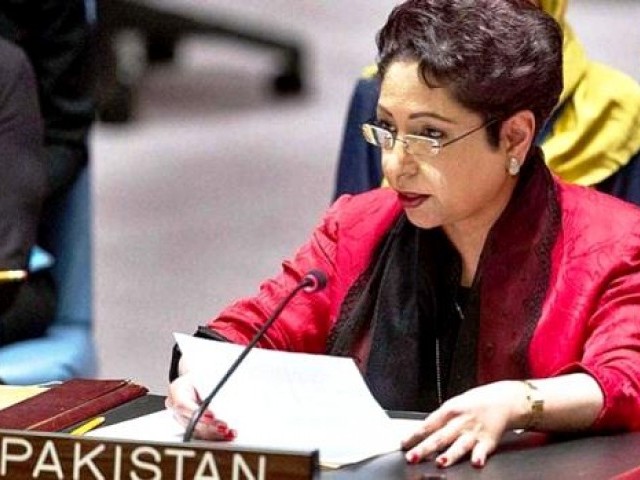Devil Soul
ELITE MEMBER

- Joined
- Jun 28, 2010
- Messages
- 22,931
- Reaction score
- 45
- Country
- Location
UN terror debate: Pakistan warns against defaming Islam
By APP
Published: February 14, 2017
2SHARES
SHARE TWEET EMAIL

Pakistan's Permanent Representative to the UN Maleeha Lodhi. PHOTO: AFP
UNITED NATIONS: Pakistan has warned against linking Islam or any other faith with terrorism, while calling for a comprehensive analysis of the threat in all its complexities.
“The global campaign against terrorism cannot be reduced to a slogan slandering Islam or any other religion or race,” Maleeha Lodhi, Pakistan’s permanent ambassador to the United Nations, told UN Security Council on Monday, as she reiterated Islamabad’s commitment to eliminate terror.
Speaking in a debate on addressing the danger of terrorist attacks against critical infrastructure, Lodhi also underscored the need to examine the reasons why terrorism — despite a global campaign against the menace — continues to evolve in new and more virulent forms and ideologies, across ever extending geographic regions, threatening peace and security.
The Pakistani envoy went on to highlight the need to address the underlying causes that create terror recruits, unresolved internal and inter-state conflicts, illegal use of force, external aggression and intervention, foreign occupation, denial of self-determination, political and economic injustice and the marginalisation and alienation of communities and groups.
Top police officials among 13 killed in Lahore suicide attack
“It is only by addressing these underlying causes can the world community erode the appeal of the narratives of hate and hostility which provide the oxygen for the existence and growth of terrorism,” she said.
Ambassador Lodhi also observed that Pakistan was suffering from “region-based and supported” terrorist acts aimed at destroying and disrupting the lives of the people, but the country was determined and fully capable of repelling such state sponsored terrorism.
Pakistan’s resilience has been tested many times, she said, emphasising that a multi-pronged strategy — the military-led Operation Zarb-e-Azb — helped to destroy terror outfits and constrain their ability to carry out lethal attacks.
“This comprehensive approach has succeeded in expelling terrorist organisations from our territory and greatly constrained their ability to carry out lethal attacks, as evident from the dramatic decline in the number of such attacks, despite the cowardly attack in Lahore,” she said.
Pointing out that Pakistan continues to increasingly face terrorists supported externally, she said, “One of their principal targets is the major infrastructure we are currently building in Pakistan in order to undermine our economic accomplishments and stability” — an obvious reference to the China-Pakistan Economic Corridor (CPEC) project.
By APP
Published: February 14, 2017
2SHARES
SHARE TWEET EMAIL

Pakistan's Permanent Representative to the UN Maleeha Lodhi. PHOTO: AFP
UNITED NATIONS: Pakistan has warned against linking Islam or any other faith with terrorism, while calling for a comprehensive analysis of the threat in all its complexities.
“The global campaign against terrorism cannot be reduced to a slogan slandering Islam or any other religion or race,” Maleeha Lodhi, Pakistan’s permanent ambassador to the United Nations, told UN Security Council on Monday, as she reiterated Islamabad’s commitment to eliminate terror.
Speaking in a debate on addressing the danger of terrorist attacks against critical infrastructure, Lodhi also underscored the need to examine the reasons why terrorism — despite a global campaign against the menace — continues to evolve in new and more virulent forms and ideologies, across ever extending geographic regions, threatening peace and security.
The Pakistani envoy went on to highlight the need to address the underlying causes that create terror recruits, unresolved internal and inter-state conflicts, illegal use of force, external aggression and intervention, foreign occupation, denial of self-determination, political and economic injustice and the marginalisation and alienation of communities and groups.
Top police officials among 13 killed in Lahore suicide attack
“It is only by addressing these underlying causes can the world community erode the appeal of the narratives of hate and hostility which provide the oxygen for the existence and growth of terrorism,” she said.
Ambassador Lodhi also observed that Pakistan was suffering from “region-based and supported” terrorist acts aimed at destroying and disrupting the lives of the people, but the country was determined and fully capable of repelling such state sponsored terrorism.
Pakistan’s resilience has been tested many times, she said, emphasising that a multi-pronged strategy — the military-led Operation Zarb-e-Azb — helped to destroy terror outfits and constrain their ability to carry out lethal attacks.
“This comprehensive approach has succeeded in expelling terrorist organisations from our territory and greatly constrained their ability to carry out lethal attacks, as evident from the dramatic decline in the number of such attacks, despite the cowardly attack in Lahore,” she said.
Pointing out that Pakistan continues to increasingly face terrorists supported externally, she said, “One of their principal targets is the major infrastructure we are currently building in Pakistan in order to undermine our economic accomplishments and stability” — an obvious reference to the China-Pakistan Economic Corridor (CPEC) project.




